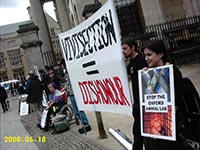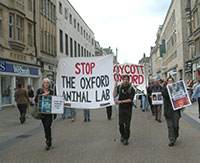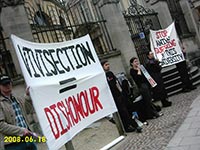


Over thirty campaigners took their places opposite the entrance to the Sheldonian Theatre on Catte Street, distributing leaflets and talking to the public who were milling around waiting for the procession to arrive. As the 'great and the good' made their way into the building, the protesters made sure that everyone could hear them register their opposition to vivisection at Oxford University, and their determination to see an end to it. They also made the public aware about the fact that, yet again, Oxford has bestowed an honour on an individual who works for another institution that has been exposed as a place of animal abuse. This year an award was made to Prof Ada Yonath, of the Israeli Weizmann Institute, where horrific abuse of primates was recently exposed* after an undercover investigation, the evidence from which is currently being heard by the court in that country.
After the procession had entered the building and the crowd on Catte Street had dispersed, the protesters mover their demonstration round the corner to the busier Broad Street where, as ever, they used banners, placards, leaflets, an information stall and, of course, their voices to get their message across to those in the vicinity. As always the response received was overwhelmingly positive, with many leaflets taken and signatures added to petitions, with just a few detractors, who scurried by, muttering clichés regarding getting jobs and lives. It is amazing that individuals from such a supposedly academically excellent institution are unable to engage in intelligent argument.
It was at this demo two years ago that sixteen protesters were unlawfully arrested, and the police presence this year again was vast, with lawful protesters outnumbered at least two to one by police officers, no doubt in an attempt to impress and ingratiate themselves with their puppet masters at the university. The polices' claim that they are impartial was clearly shown to be the lie that protesters have long known it to be when Chief Superintendent Morley of Thames Valley Police was seen entering the ceremony in full uniform accompanied by the head of security of the university, smiling and laughing together as they went.
As the guests left the Theatre after the ceremony, some of the demonstrators again went round in to Catte Street, with others staying put in Broad Street, to ensure that everyone leaving would hear about the atrocities being perpetrated in the labs. When everyone had left, the protesters decided to move the demo into the main shopping area in Cornmarket, which was busy as ever with shoppers and tourists , where again they set up their information stall, distributed leaflets and caught peoples' attention with use of the megaphone. Interestingly the police presence was reduced drastically to two officers who spent their time lolloing against a wall; clearly the university are not too bothered about the protesters presence in the town. After a while the protesters decided to hold a short march up and down Cornmarket in order to reach everybody that was there. Again this received a lot of support and resulted in more people visiting the stall in order to obtain more information.
Article 10 of The Human Rights Act enshrines in law the right to 'hold opinions and to receive and impart information and ideas without interference by public authority and regardless of frontiers'. SPEAK will continue demonstrate at occasions such as this in order to ensure that everyone in Oxford receives the facts about the horrors that occur in the university's labs each and every day, as is their right to do so, and to make it clear to the university that we will not be bullied or intimidated into going away. The animals in Oxford University's labs have no one to fight for their rights but us, and this we will continue to do until all are free and vivisection is brought to an end, once and for all.
*
 http://www.speakcampaigns.org/articles/20080221weizmann.php
http://www.speakcampaigns.org/articles/20080221weizmann.php 
 Homepage:
Homepage:
Comments
Hide the following 2 comments
Pot calling...?
29.06.2008 10:30
terrorist (AR Activist...?)
• noun a person who uses violence and intimidation in the pursuit of political aims.
ViewFinder
ViewFinder
30.06.2008 22:19
Great men and women have demonstrated throughout history that laws can be immoral, and that we can be justified in breaking them. Those who object to law-breaking under all circumstances would have to condemn:
The Tiananmen Square demonstrators.
The Boston Tea Party participants.
Mahatma Gandhi and his followers.
World War II resistance fighters.
The Polish Solidarity Movement.
Vietnam War draft card burners.
The list could be continued almost indefinitely.
Conversely, laws sometimes don't reflect our moral beliefs. After World War II, the allies had to hastily write new laws to fully prosecute the Nazi war criminals at Nuremburg. Dave Foreman points out that there is a distinction to be made between morality and the statutes of a government in power.
It could be argued that the principle we are talking about does not apply. Specifically, the law against destruction of property is not immoral, and we therefore should not break it. However, a related principle can be asserted. If a law is invoked to defend immoral practices, or to attempt to limit or interfere with our ability to fight an immoral situation, then justification might be claimed for breaking that law.
In the final analysis, this is a personal decision for each person to make in consultation with their own conscience. --DG
"Certainly one of the highest duties of the citizen is a scrupulous obedience to the laws of the nation. But it is not the highest duty." --Thomas Jefferson (3rd U.S. President)
"I say, break the law." --Henry David Thoreau (essayist and poet)
ARA